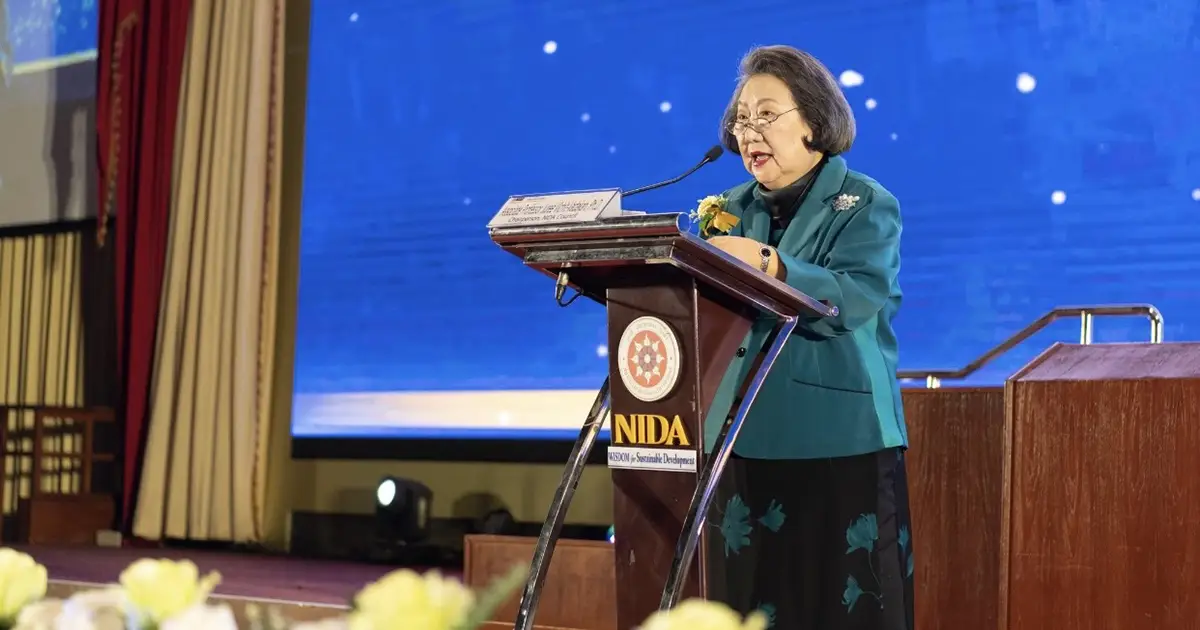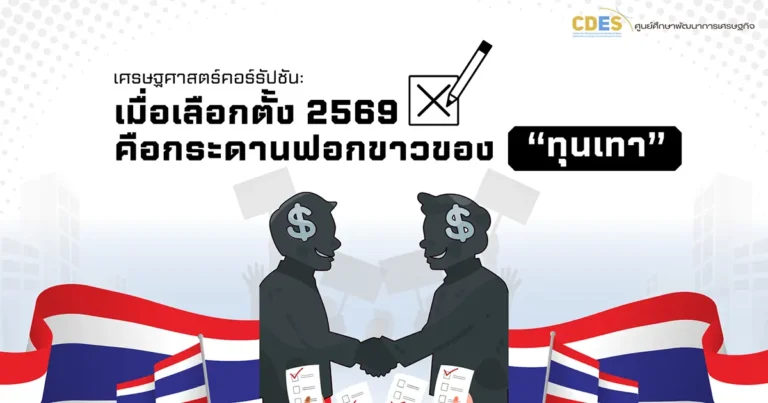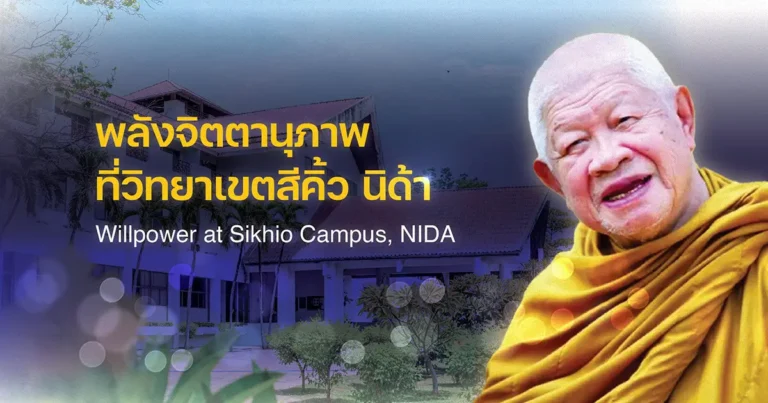By Assoc. Prof. Juree Vichit-Vadakan, Ph.D.
Chairperson of NIDA Council
Summary of keynote highlights by
Assoc. Prof. Patthareeya Lakpetch, Ph.D.
In a profoundly reflective and ethically grounded keynote, Assoc. Prof. Juree reminded the NIC–NIDA 2025 audience that the greatest challenges confronting humanity — inequality, climate change, moral decline, and the erosion of trust — cannot be solved by technology, policy, or institutions alone. What the world urgently needs, she argued, is not more intelligence, but more humanity — a revival of shared moral values that guide behavior, sustain trust, and anchor progress in the Intelligent age.
Assoc. Prof. Juree began by identifying the defining crises of our time: widening inequality, environmental degradation, and the weakening of empathy and justice. Ideals such as democracy, fairness, and human dignity, she observed, have become fragile, while cruelty and indifference increasingly dominate the global narrative. “We live in a world,” she said, “where peace, honesty, and compassion seem too remote to attain.”
Although the United Nations’ Sustainable Development Goals (SDGs) offer a shared global vision for progress, shequestioned why the world still struggles to turn these aspirations into reality. Treaties are signed, but commitments soon fade. Institutions build frameworks, often overlooking the moral conviction that gives them true meaning. She reminded the audience that sustainability cannot rest on policy alone — it demands moral courage, the resolve to forego present comfort for the well-being of generations to come.
When speaking about technology, sheacknowledged that artificial intelligence and digital innovation have profoundly transformed the modern world. Yet she observed that these very forces have also widened the distance between people — between parents and children, teachers and students, and even citizens and the truth within the online sphere. “We are living in an age,” she reflected, “where people value winning more than doing what is right.”
She reminded the audience that true collaboration cannot arise from institutional agreements alone. It must be built upon trust, honesty, respect, and empathy — virtues that sustain cooperation and peace. “Values,” she emphasized, “are the moral compass of society — the invisible foundation that allows people to live and work together in harmony and sustainability.”
Assoc. Prof. Juree emphasized that the heart of her message lies in values education. This, she noted, is not the duty of schools alone, but a shared responsibility of families, institutions, and society as a whole. In today’s world, where children spend more time in front of screens than with parents or teachers, education must go beyond academic achievement to cultivate ethical reasoning and moral awareness. Without it, societies risk raising a generation that grows in intelligence but declines in integrity and compassion. She reminded that virtues such as honesty, humility, kindness, and self-discipline must not only be taught in classrooms, but lived and practiced every day. “Values,” she said, “must be experienced — not memorized.”
As artificial intelligence advances at an extraordinary pace, she alsoreminded that “human conscience must lead technology, not follow it.” Without ethical direction, she warned, technology may cease to serve humanity and instead amplify greed, exploitation, and destruction. She urged innovators, leaders, and creators to place humanity at the center of every design and decision — to ensure that technology reflects our compassion, not merely our intelligence.
At the core of her message was a timeless ideal: thepursuit of the common good. True progress, Assoc. Prof. Juree said that it was not measured by personal success, but by the capacity to act for others and for society as a whole. She emphasized that social capital — the trust, empathy, and shared responsibility that bind communities together — is the invisible strength of a sustainable world. When individuals think only of themselves, society begins to fracture. Rebuilding trust in institutions and rekindling a sense of collective purpose, she concluded, are therefore essential foundations of a humane and enduring future.
In her closing remarks, Assoc. Prof. Juree left the audience with a profound reflection: “No system, no law, and no technology can be truly sustainable without ethics in the human heart. Sustainable development must begin with nurturing moral integrity — for only the right values can lead to the right actions.”
ปาฐกถาพิเศษ “คุณค่า” คือ รากฐานของยุคแห่งปัญญา
โดย รองศาสตราจารย์ ดร. จุรี วิจิตรวาทการ
ประธานสภาสถาบันบัณฑิตพัฒนบริหารศาสตร์
สรุปโดย รองศาสตราจารย์ ดร.พัทรียา หลักเพ็ชร
ในปาฐกถาอันทรงพลังและเปี่ยมด้วยแง่คิดทางจริยธรรม รองศาสตราจารย์ ดร. จุรี ได้สะท้อนให้เห็นอย่างลึกซึ้งว่า ความท้าทายที่ยิ่งใหญ่ที่สุดของโลกในยุคปัจจุบัน — ไม่ว่าจะเป็นความเหลื่อมล้ำ การเปลี่ยนแปลงสภาพภูมิอากาศ ความเสื่อมถอยของศีลธรรม หรือการสูญเสียความไว้วางใจ — ล้วนไม่อาจแก้ไขได้ด้วยเทคโนโลยีหรือนโยบายเพียงอย่างเดียว สิ่งที่มนุษยชาติต้องการอย่างเร่งด่วนคือ “การฟื้นคืนคุณค่าร่วมของความเป็นมนุษย์” ซึ่งจะเป็นเข็มทิศทางศีลธรรมในการนำทางโลกยุคแห่งปัญญา
รองศาสตราจารย์ ดร. จุรี เริ่มต้นด้วยการชี้ให้เห็นถึงวิกฤตหลักของยุคสมัย — ความเหลื่อมล้ำที่ขยายวงกว้าง การทำลายสิ่งแวดล้อม ความอยุติธรรม และการเสื่อมถอยของความเห็นอกเห็นใจ อุดมคติอย่างประชาธิปไตย ความเท่าเทียม และศักดิ์ศรีความเป็นมนุษย์กำลังเปราะบางลง ขณะที่ความโหดร้ายและความเฉยชากลายเป็นเรื่องปกติในสังคม ท่านกล่าวว่า “เรากำลังอยู่ในโลกที่สันติ ความซื่อสัตย์ และความเมตตา ดูเหมือนเป็นอุดมคติที่อยู่ไกลเกินเอื้อม” แม้เป้าหมายการพัฒนาที่ยั่งยืน (SDGs) ของสหประชาชาติจะเป็นกรอบที่ทั่วโลกให้การยอมรับ แต่ความคืบหน้ากลับชะลอตัว เพราะหลายประเทศลงนามในข้อตกลงแต่ขาดการยึดมั่นปฏิบัติ ท่านชี้ประเด็นว่า การพัฒนาอย่างยั่งยืนจะเกิดขึ้นได้จริง ต้องเริ่มจาก “ความเชื่อทางศีลธรรม” — ความพร้อมที่จะเสียสละความสะดวกสบายในวันนี้ เพื่ออนาคตของคนรุ่นหลัง
เมื่อกล่าวถึงเทคโนโลยี รองศาสตราจารย์ ดร. จุรี ยอมรับว่า AI และนวัตกรรมดิจิทัลได้เปลี่ยนโลกอย่างมหาศาล แต่ในขณะเดียวกันก็สร้างระยะห่างระหว่างมนุษย์กับมนุษย์มากขึ้น ทั้งระหว่างพ่อแม่กับลูก ครูกับนักเรียน หรือประชาชนกับความจริงในสังคมออนไลน์ “เรากำลังอยู่ในยุคที่ผู้คนให้คุณค่ากับการชนะ มากกว่าการทำในสิ่งที่ถูกต้อง” โดยท่านได้ย้ำเตือนว่า ความร่วมมือที่แท้จริงไม่อาจเกิดจากข้อตกลงของสถาบันใด ๆ หากปราศจากความไว้วางใจ ความซื่อสัตย์ ความเคารพ และความเข้าอกเข้าใจ “คุณค่า” จึงเป็นรากฐานของความร่วมมืออย่างแท้จริง — เป็นเข็มทิศทางศีลธรรมที่ทำให้สังคมอยู่ร่วมกันได้อย่างยั่งยืน
ท่านกล่าวว่า แก่นสำคัญของปาฐกถาคือ การปลูกฝังคุณค่าผ่านการศึกษา (Values Education) หน้าที่นี้ไม่ใช่ของโรงเรียนเท่านั้น แต่เป็นความรับผิดชอบร่วมของครอบครัว สถาบัน และสังคมโดยรวมในโลกที่เด็กใช้เวลาหน้าจอมากกว่ากับพ่อแม่หรือครู หากการศึกษาไม่สอนให้รู้จักคิดอย่างมีจริยธรรม สังคมอาจเติบโตขึ้นโดยปราศจากความซื่อสัตย์และความเมตตา ดังนั้นคุณค่าอย่าง ความซื่อสัตย์ ความถ่อมตน ความกรุณา และความมีวินัยในตนเอง ต้องไม่เพียงถูกสอน แต่ต้องถูก “ใช้ชีวิตอยู่กับมัน” ทุกวัน
เมื่อปัญญาประดิษฐ์พัฒนาอย่างรวดเร็ว รองศาสตราจารย์ ดร. จุรี ย้ำเตือนว่า “จิตสำนึกของมนุษย์ต้องเป็นผู้นำ ไม่ใช่ผู้ตามเทคโนโลยี”เพราะหากขาดเข็มทิศทางศีลธรรม เทคโนโลยีอาจกลายเป็นเครื่องมือของความโลภและการทำลายมากกว่าการสร้างสรรค์ ท่านจึงขอให้ผู้พัฒนาเทคโนโลยี ผู้นำ และนวัตกรทุกคน ฝังจริยธรรมและความเป็นมนุษย์ไว้ในทุกการออกแบบและการตัดสินใจ
หัวใจของสาระทั้งหมด คือ อุดมการณ์แห่ง “ประโยชน์ส่วนรวม” — การทำสิ่งที่ดีเพื่อสังคมมากกว่าตนเอง ท่านกล่าวว่า “ทุนทางสังคม” ที่เกิดจากความไว้วางใจและความรับผิดชอบร่วมกัน คือพลังที่ทำให้ชุมชนเติบโต เมื่อผู้คนคิดเพียงเพื่อตนเอง สังคมก็เริ่มแตกแยก ดังนั้น การฟื้นฟูความเชื่อมั่นในสถาบันและจิตสำนึกของความเป็นส่วนรวม จึงเป็นรากฐานของความยั่งยืน ในตอนท้าย รองศาสตราจารย์ ดร. จุรี ฝากข้อคิดไว้ว่า “ไม่มีระบบ กฎหมาย หรือเทคโนโลยีใดจะยั่งยืนได้ หากปราศจากจริยธรรมในหัวใจของมนุษย์ การพัฒนาที่ยั่งยืนต้องเริ่มจากการสร้างคนให้มีคุณธรรม เพราะคุณค่าที่ถูกต้องเท่านั้น ที่จะนำไปสู่การกระทำที่ถูกต้อง”




